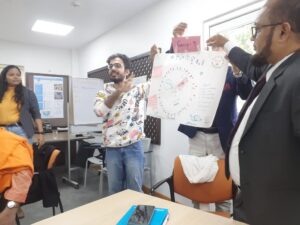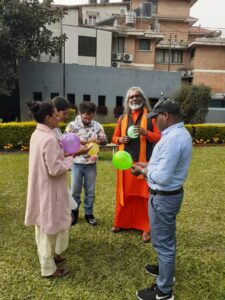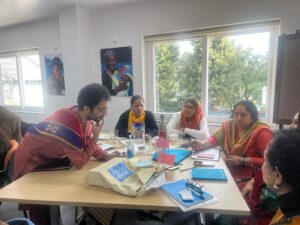 Mr. Yash Dhamija is now a certified Mind-Heart Dialogue National trainer after successfully completing the week-long Mind-Heart Dialogue Training of Trainers (MHD TOT) in Kathmandu, Nepal from November 27 to December 1, 2023.
Mr. Yash Dhamija is now a certified Mind-Heart Dialogue National trainer after successfully completing the week-long Mind-Heart Dialogue Training of Trainers (MHD TOT) in Kathmandu, Nepal from November 27 to December 1, 2023.
The Mind-Heart Dialogue is an evidence-based reflective and experiential process, exploring faith convictions, lived experiences and knowledge to influence positive social and behaviour change. It supports faith groups and development partners to work together to protect and empower children, families, and communities.
 Mr. Yash Dhamija is the Youth Member of RfP India chapter. He holds a master’s degree in Comparative Religions from Jamia Millia Islamia, New Delhi. Having worked in the development sector for 4 years, earlier with organizations like Teach for India and Global Peace Foundation India, Mr. Dhamija has got an opportunity to combine education and peacebuilding to bring about holistic development of many children in India. He has also worked on WASH rights of children and girls in government schools of Delhi, as a Co-founder of the project NEER : ‘Where health is Nourished through Water’. He is an avid interfaith dialogue supporter, having conducted 14 batches of program Facets of Faith, which he designed to bring together faith leaders across India calling out for innovative and moral leadership among youth and adolescent girls.
Mr. Yash Dhamija is the Youth Member of RfP India chapter. He holds a master’s degree in Comparative Religions from Jamia Millia Islamia, New Delhi. Having worked in the development sector for 4 years, earlier with organizations like Teach for India and Global Peace Foundation India, Mr. Dhamija has got an opportunity to combine education and peacebuilding to bring about holistic development of many children in India. He has also worked on WASH rights of children and girls in government schools of Delhi, as a Co-founder of the project NEER : ‘Where health is Nourished through Water’. He is an avid interfaith dialogue supporter, having conducted 14 batches of program Facets of Faith, which he designed to bring together faith leaders across India calling out for innovative and moral leadership among youth and adolescent girls.
 According to him, “The process of MHD would enable people to connect with their values and become enablers of change.”
According to him, “The process of MHD would enable people to connect with their values and become enablers of change.”
Faith plays a crucial role in the lives of many Indians, yet the entire potential of faith in tangibly affecting our lives in areas like education, health, environmental protection etc, remains evanescent. Hence, the process of MHD, which outlines a clear and data driven approach, is like an ambassador who drives a two way traffic of communication between faith leaders and people. This broadcaster of hope and trust is what we all need in our work, especially dealing with children and adolescent girls.
MHD acts as a bridge connecting the faith with daily life struggles through engagement and participatory dialogue. I see it as shifting the focus to ‘now’ with the help of ‘then’.
 Thus, I very clearly see how the MHD training would help the RfP India chapter in rejuvenating its resolutions and structuring the priorities especially adopted during the workshop: Use of religious platforms to speak message on adolescent anemia, using different faith based run media platforms to reach population on ECM, Using social media to profile messages from faith based perspective on Anaemia and ECM, and Coordinating an alliance with faith based government led flagship programmes.
Thus, I very clearly see how the MHD training would help the RfP India chapter in rejuvenating its resolutions and structuring the priorities especially adopted during the workshop: Use of religious platforms to speak message on adolescent anemia, using different faith based run media platforms to reach population on ECM, Using social media to profile messages from faith based perspective on Anaemia and ECM, and Coordinating an alliance with faith based government led flagship programmes.

RfP India will extensively use this framework to provide quantifiable markers of change in the lives of children and adolescent girls through its multifarious intervention programs.
